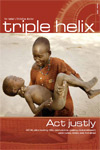Juniors' Forum has decided to spend a few issues exploring the gentle art of good communication. 'Oh no!' I hear you cry. 'How boring!' Certainly that's how I felt as a houseman (pre-registration doctor), but then my one and only undergraduate experience of 'learning communication skills' had been highly ironic – a solid hour's lecture on the theory of good communication, delivered in a monotone voice by a tweed-suited academic who failed to introduce himself and never once looked up from his densely worded acetates!
Like many GP registrars, I endured rather than enjoyed videoing my consultations; you have to watch them with your tutor, critique your communication skills and read all about different consultation models. Woe betide the candidate who attempts the MRCGP viva before digesting Roger Neighbour's book! [1] Amongst all the theory though, I did glean some very sensible tips that have made my subsequent clinical life an awful lot easier. Optimising your communication skills can help you...
Forestall complaints
'You've had a complaint...' One of the most stressful phrases a doctor ever hears. Instinctively you ask yourself, 'What have I done?!' Actually though, the complaint is more likely to be about what you've said, or not said, than what you've done! A high percentage of formal complaints are rooted in poor communication rather than medical error. [2] Only on House does diagnostic brilliance prompt patients to tear up half-written complaints about their physician's appalling lack of social skills! In the real world, patients often rank our ability to communicate as more important than our diagnostic accuracy! Most of the thank-you notes we receive express gratitude for kindness and empathy rather than diagnostic skill.
It's often possible to pick up on people's discontent. At this early stage, it's often relatively easy to defuse the situation.
- Adopt unthreatening body posture – unfold your arms and express concern on your face.
- Acknowledge distress – 'I see that you are upset. I would like to help...'
- What are their ideas, concerns and expectations?
- Offer to explain any obvious misunderstandings.
- Summarise their grievance – 'So, and please correct me if I've misunderstood, you feel that...'
- Use the S word – 'I'm sorry that you've been upset'.
Pass exams
Optimising your communication skills can help you pass exams! Most of the Royal Colleges now include some assessment of candidates' communication skills in their membership exams. Medical schools too are becoming increasingly concerned about good communication. Today's medical students receive a mixture of theoretical seminars and practical workshops in the art of communication. Students get to practise talking on medical actors to start with, rather than embarrassing themselves in front of real patients. And come exam time, the student who's worked to develop their communication skills is easy to spot.
Share faith
Just about every hospital has its resident 'grump' – the surgical registrar everyone dreads having to bleep. But, just like you, the majority of juniors are happy and genial enough. What else then could mark you out as a Christian? What about your way of communicating with patients? Anna recalls...
I disliked my new job. The Obs & Gynae department seemed cold and unfriendly, nothing like the comradely atmosphere I'd enjoyed in A&E. I was a supernumerary SHO, headed for GP Land, whereas all the other juniors were career gynaecologists, set on getting to theatre as often as possible. As I was a spare pair of hands, they were forever asking: 'Could you just pop down to EPU [Early Pregnancy Unit]? It's my turn but I want to stay in theatre!' Soon I was making almost daily trips down to EPU.
Every miscarriage is a personal tragedy. I counted it a privilege to gently break the news to each woman and then provide good medical care for her. I enjoyed working with the unit's lovely nurse and hoped for a suitable opportunity to share my faith with her. Yet I was very surprised when she herself provided me with my opportunity: 'I've been thinking about you. You talk to the women, explain things, and deal with them so kindly. Why are you like that?' I was more than happy to answer her question! Moreover, I was thrilled to realise that I'd been communicating my faith all along. I share my faith with everyone I meet and occasionally I use words. (St Francis of Assisi)
































